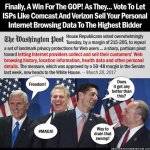- Joined
- Sep 20, 2012
- Messages
- 5,368
- Reaction score
- 2,117
- Location
- In The Crosshairs
- Gender
- Male
- Political Leaning
- Very Conservative

The House just voted to wipe out the FCCs landmark Internet privacy protections
House Republicans voted overwhelmingly Tuesday, by a margin of 215-205, to repeal a set of landmark privacy protections for Web users, issuing a sweeping rebuke of Internet policies enacted under the Obama administration. It also marks a sharp, partisan pivot toward letting Internet providers collect and sell their customers' Web browsing history, location information, health data and other personal details.
The measure, which was approved by a 50-48 margin in the Senate last week, now heads to the White House, where President Trump is expected to sign it.
Congress's joint resolution empowers Internet providers to enter the $83 billion market for online advertising now dominated by Google and Facebook. It is likely to lend momentum to a broader GOP rollback of Obama-era technology policies, and calls into question the fate of other tech regulations such as net neutrality, which was approved in 2015 over strident Republican objections and bans Internet providers from discriminating against websites. And it is a sign that companies such as AT&T, Comcast and Verizon will be treated more permissively at a time when conservatives control all three branches of government.
Supporters of Tuesday's repeal vote argued the privacy regulations, written by the Federal Communications Commission, stifle innovation by forcing Internet providers to abide by unreasonably strict guidelines.
https://www.washingtonpost.com/news...e-fccs-landmark-internet-privacy-protections/
Happy Dayzzz are hear again ... the sky's above are dark again! Happy Dayzzz are hear again!
